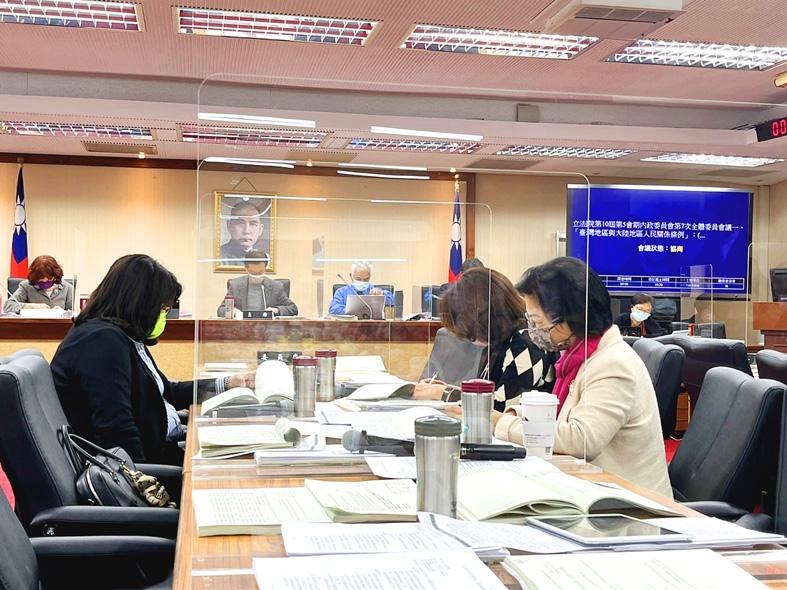The legislature’s Internal Administration Committee on Thursday approved a preliminary review of amendments seeking to prevent Chinese-funded enterprises from infiltrating the nation and poaching Taiwanese talent.
The amendments to the Act Governing Relations Between the People of the Taiwan Area and the Mainland Area (臺灣地區與大陸地區人民關係條例) were proposed in response to frequently reported cases of Chinese-funded enterprises disguising themselves as Hong Kong or other foreign-funded firms to poach Taiwanese talent or steal “core” technologies, the Mainland Affairs Council (MAC) said.
MAC Minister Chiu Tai-san (邱太三) said that Chinese-funded enterprises often illegally conduct business through associates in Taiwan or by investing in companies in a third region to evade regulations, which jeopardizes Taiwan’s economic order and national interests.

Photo: Chen Yu-fu, Taipei Times
Under the amendments, legal persons, groups and members of entities commissioned, subsidized or invested in to a certain extent by government agencies to engage in business involving the nation’s core technologies would need government approval to travel to China.
The requirement would remain for three years after the commission, subsidy or investment ends, or three years after the person has left their position.
Offenders could face fines of NT$2 million to NT$10 million (US$69,898 to US$349,491).
Chinese businesses or Chinese-funded entities based outside of China cannot engage in business activities in Taiwan without government permission, the bill says.
Contraveners would face up to three years in prison and fines of up to NT$15 million, while anyone who allows themselves to be used as surrogates for Chinese-funded businesses to operate in Taiwan under their names would face fines from NT$120,000 to NT$2.5 million.
The committee on Thursday also reviewed amendments to the National Security Act (國家安全法) that would criminalize “economic espionage” and extraterritorial use of core technologies and business secrets.
Under the proposals, people who engage or attempt to engage in economic espionage and leak information to China or foreign hostile forces would be sentenced to five to 12 years in prison and fined NT$5 million to NT$100 million.
Those who use or attempt to use business secrets outside of Taiwan would face three to 10 years in prison and fines of NT$5 million to NT$50 million.
Under the amendments, the High Court, the Intellectual Property Court and other courts dealing with commercial matters have jurisdiction over the first instance of an economic espionage case, which should be handled as soon as possible to protect national security.
People who contravene the National Security Act would be tried in special courts or their cases heard by a designated person, the amendments state.
During the review, Democratic Progressive Party Legislator Chiang Yung-chang (江永昌) said that the penalties were too light, as offenders who surrender themselves could be exempted from imprisonment, and legal persons would only have to pay fines instead of disbanding.
A lack of consensus over the amendments means the draft must be reviewed again.

The Central Weather Administration (CWA) today issued a sea warning for Typhoon Fung-wong effective from 5:30pm, while local governments canceled school and work for tomorrow. A land warning is expected to be issued tomorrow morning before it is expected to make landfall on Wednesday, the agency said. Taoyuan, and well as Yilan, Hualien and Penghu counties canceled work and school for tomorrow, as well as mountainous district of Taipei and New Taipei City. For updated information on closures, please visit the Directorate-General of Personnel Administration Web site. As of 5pm today, Fung-wong was about 490km south-southwest of Oluanpi (鵝鑾鼻), Taiwan's southernmost point.

Tropical Storm Fung-Wong would likely strengthen into a typhoon later today as it continues moving westward across the Pacific before heading in Taiwan’s direction next week, the Central Weather Administration (CWA) said. As of 8am, Fung-Wong was about 2,190km east-southeast of Cape Oluanpi (鵝鑾鼻), Taiwan’s southernmost point, moving westward at 25kph and possibly accelerating to 31kph, CWA data showed. The tropical storm is currently over waters east of the Philippines and still far from Taiwan, CWA forecaster Tseng Chao-cheng (曾昭誠) said, adding that it could likely strengthen into a typhoon later in the day. It is forecast to reach the South China Sea

Almost a quarter of volunteer soldiers who signed up from 2021 to last year have sought early discharge, the Legislative Yuan’s Budget Center said in a report. The report said that 12,884 of 52,674 people who volunteered in the period had sought an early exit from the military, returning NT$895.96 million (US$28.86 million) to the government. In 2021, there was a 105.34 percent rise in the volunteer recruitment rate, but the number has steadily declined since then, missing recruitment targets, the Chinese-language United Daily News said, citing the report. In 2021, only 521 volunteers dropped out of the military, the report said, citing

Nearly 5 million people have signed up to receive the government’s NT$10,000 (US$322) universal cash handout since registration opened on Wednesday last week, with deposits expected to begin tomorrow, the Ministry of Finance said yesterday. After a staggered sign-up last week — based on the final digit of the applicant’s national ID or Alien Resident Certificate number — online registration is open to all eligible Taiwanese nationals, foreign permanent residents and spouses of Taiwanese nationals. Banks are expected to start issuing deposits from 6pm today, the ministry said. Those who completed registration by yesterday are expected to receive their NT$10,000 tomorrow, National Treasury